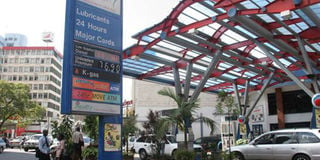VAT: Bad policy or political hypocrisy

Motorists fuel at KenolKobil station along Koinange Street in Nairobi. PHOTO | FILE | NATION MEDIA GROUP
What you need to know:
Under the VAT Act 2013, petroleum products were exempted from the tax up to August 31, 2016.
In June 2016, the exemption was extended to August 31, 2018.
VAT is charged on legally identified goods, services and supplies.
By law, petroleum products are subject to VAT effective September 1, 2018.
It could well be that in the raging battle over value added tax (VAT) on petroleum products, those who have coalesced around its short-term negative socioeconomic impact will carry the day.
But what will be the cost? Who will be the real loser? Is the whole project about national debt? Does the VAT portend any socioeconomic well-being for Akinyi, Fatuma and Mwikali?
In this matter, are there roads that must not be followed, however smooth? Is it a case of a bad policy or a severe scarcity of politicians courageous enough to speak the truth?
From the outset, the trend where Parliament has been distinguished by the haste to pass politically convenient laws while viciously protecting unjustifiable perks for MPs is consistent with a system deliberately focused on excluding the larger majority from meaningful economic participation through Machiavellian deception.
POLITICALLY STRONG
This is a system where the few politically strong amass what they can as the majority are tranquillised with political rhetoric as they suffer what they must.
VAT is charged on legally identified goods, services and supplies. Under the VAT Act 2013, petroleum products were exempted from the tax up to August 31, 2016. In June 2016, the exemption was extended to August 31, 2018.
By law, petroleum products are subject to VAT effective September 1, 2018. However, through the Finance Bill 2018, the National Assembly has proposed to further extend the transition period by two years to September 1, 2020. This Bill is yet to be presented to the President for assent.
HUGE BUDGET DEFICIT
The national Budget for the 2018/19 financial year (passed by the same National Assembly) projected revenue proposals that included Sh35 billion from VAT to be levied from petroleum products effective September 1, 2018. If this Bill is assented to, the Sh35 billion now becomes a huge budget deficit.
And that is not all. In a manner that can only be described as an attempt at deceiving the electorate, the Finance Bill 2018 further removed tax policy measures with a negative revenue impact of another Sh13.6 billion. Earlier, during deliberations for the Appropriation Bill 2018, the National Assembly provided for an additional Sh18.9 billion expenditure — most probably with an eye on their perks. The implication is that Kenyans have to contend with a budget deficit of Sh70 billion in 2018/19.
We are some three months into the financial year. At the national government level, ministries, departments and agencies have already commenced their annual programmes and projects as per the Budget passed in June.
REVENUE COLLECTION
The same case applies to the county governments and the constitutional independent bodies, including the Judiciary, National Assembly and the IEBC. Neither the National Assembly nor the Judiciary, who have stopped this revenue collection, have suggested how to bridge the gap in their own exorbitant budgets.
With the gusto the MPs have displayed, one would have expected them to identify some of their allowances for immediate freeze. An example is CDF, identified as manifesting a clear constitutional conflict of interest between oversight and management of public funds.
The options for the National Treasury are now not only limited, but effectively more painful for ‘Wanjiku’. They include expenditure cuts for critical but politically less sensitive development projects and social services to the tune of Sh70 billion or increased borrowing, piling up debt.
Alternatively, the Treasury can increase rates for other tax heads such as pay as you earn (PAYE), corporation tax and excise duty. The last and most painful option would be raising VAT for other services from 16 to 18 per cent like the other East African Community states.
STRUGGLING INDUSTRIES
Economists have warned that imposing a heavier burden on VAT payers will further choke struggling industries, hence jeopardise the job creation dream for the ballooning jobless youth.
Is the Treasury levying VAT to pay debt? An in-depth study of the Appropriation Bill 2018 would show that the projected revenue from fuel VAT is intended for projects to improve the GDP and standards of living for the least privileged.
The much-maligned national debt has been incurred to upgrade roads, airports, seaports, railways and energy generation, without which the vision of a prosperous Kenya will become a mirage.
For Kenya to ever realise prosperity as known and enjoyed in the developed world, our leaders must stop deceptive rhetoric and mobilise the citizenry to pay the painful price of development. This is the legacy our children need.
Mr Kiraithe is the Government Spokesperson





